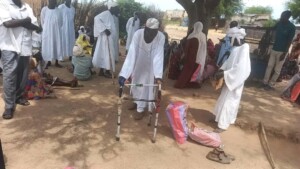Cholera in Sudan: No rehydration solutions in El Dindir, 34 die
On Friday, the number of cholera deaths in El Dindir in eastern Sudan’s Sennar rose to 34. The afflicted locality is short of rehydration solutions and medical staff. In Sinja, medics embarked on a strike.
A medical source reported from El Dindir that 13 cholera patients died on Thursday and Friday, bringing the total number of deaths in the locality to 34.
He complained about a severe shortage of rehydration solutions “while rehydration is the first thing needed for the treatment of cholera patients.
On Friday, the number of cholera deaths in El Dindir in eastern Sudan’s Sennar rose to 34. The afflicted locality is short of rehydration solutions and medical staff. In Singa, medics embarked on a strike.
A medical source reported from El Dindir that 13 cholera patients died on Thursday and Friday, bringing the total number of deaths in the locality to 34.
He complained about a severe shortage of rehydration solutions “while rehydration is the first thing needed for the treatment of cholera patients.
“The mortality rates are very high and the health authorities remain silent,” he said. “Moreover, we have no volunteers like in other places in the country, who help cleaning the environment and brief the people about the best ways to prevent the disease.”
El Awad Abdallah told Dabanga Radio that seven of his relatives died within a week in Wad El Fedeil village.
He said that four others fell ill on Friday, including two children. They were taken to the isolation centre of El Dindir Hospital.
In the villages of El Malasi, El Zindiya, and Wad Mousa in El Dindir six cholera patients died and about 30 contracted the infectious disease in the past two weeks.
Mahjoub Osman, another relative of cholera patients, reported from El Malasi village in El Dindir that “the rains have isolated our remote villages even more. The roads have become almost impassable, so we encounter great difficulties in transferring the patients to the isolation centres in El Dindir.
“The mortality rates are very high and the health authorities remain silent. We have no volunteers like in other places in the country, who help cleaning the environment and brief the people about the best ways to prevent the disease.”
Strike
Medics working at the isolation centre in the Hospital of Singa, capital of Sennar, laid down their tools on Thursday because they did not receive their salaries.
“The cholera crew, consisting of a doctor, two medical assistants, and a nurse, did not appear at the centre on Thursday and Friday,” a relative of a patient reported to this station.
“The hospital administration was forced to seek the help of health staff from the Red Crescent.”
The source added that the centre received seven new cholera cases on Friday.
More deaths
One patient died in the Kassala Hospital last week. Five others are still being treated, a listener told Radio Dabanga on Friday.
In Shendi in northern Sudan’s River Nile state, a cholera patient died at Museikatab Hospital on Wednesday.
“Relatives of the deceased transported him from the village of El Tarajema to Museikatab Hospital last Sunday,” a medical source said. “Another patient is still being treated at the hospital.”
The Kalma camp for the displaced near the South Darfur capital of Nyala recorded two cholera deaths on Thursday and Friday.
Yagoub Abdallah, General Coordinator of the Darfur camps told Dabanga Radio that the centre of the International Rescue Committee, one of the health centres in Kalma camp, admitted 74 cases of cholera since the end of June. 11 of them died.
“The other three health centres have also received dozens of cases since 25 June when the first cholera case appeared,” he said.
Since the outbreak of cholera in August last year, 940 Sudanese have died. 23,930 people have been infected all over Sudan, the National Epidemiological Corporation reported earlier this month.
Follow #CholeraInSudan, #الكوليرا_السودان for ongoing coverage by Radio Dabanga











 and then
and then